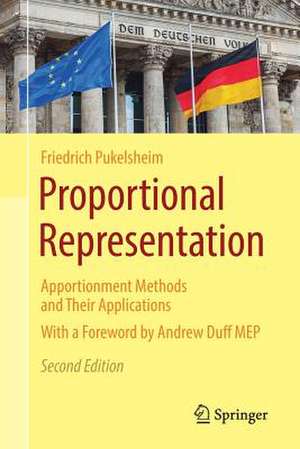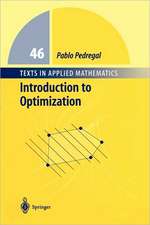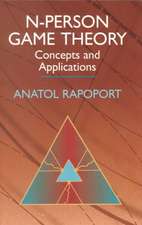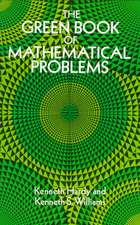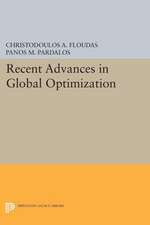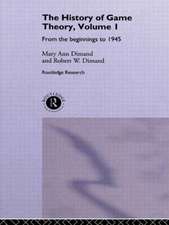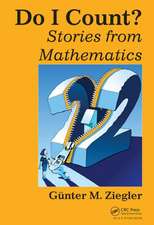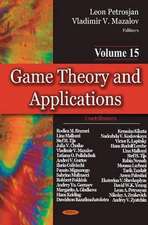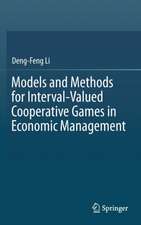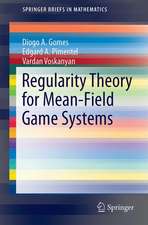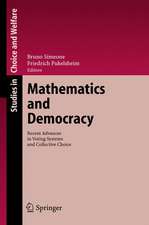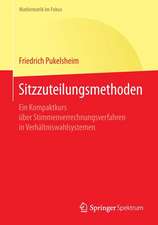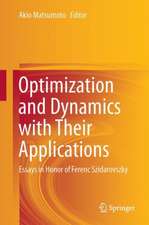Proportional Representation: Apportionment Methods and Their Applications
Autor Friedrich Pukelsheimen Limba Engleză Paperback – 17 ian 2018
Preț: 587.72 lei
Preț vechi: 691.43 lei
-15% Nou
Puncte Express: 882
Preț estimativ în valută:
112.46€ • 120.26$ • 93.77£
112.46€ • 120.26$ • 93.77£
Carte tipărită la comandă
Livrare economică 18 aprilie-02 mai
Preluare comenzi: 021 569.72.76
Specificații
ISBN-13: 9783319647067
ISBN-10: 3319647067
Pagini: 342
Ilustrații: XXVII, 342 p. 14 illus., 4 illus. in color.
Dimensiuni: 155 x 235 x 22 mm
Greutate: 0.52 kg
Ediția:2nd ed. 2017
Editura: Springer International Publishing
Colecția Springer
Locul publicării:Cham, Switzerland
ISBN-10: 3319647067
Pagini: 342
Ilustrații: XXVII, 342 p. 14 illus., 4 illus. in color.
Dimensiuni: 155 x 235 x 22 mm
Greutate: 0.52 kg
Ediția:2nd ed. 2017
Editura: Springer International Publishing
Colecția Springer
Locul publicării:Cham, Switzerland
Cuprins
Exposing Methods: The 2014 European Parliament Elections.- Imposing Constitutionality: The 2009 Bundestag Election.- From Reals to Integers: Rounding Functions and Rounding Rules.- Divisor Methods of Apportionment: Divide and Round.- Quota Methods of Apportionment: Divide and Rank.- Targeting the House Size: Discrepancy Distribution.- Favoring Some at the Expense of Others: Seat Biases.- Preferring Stronger Parties to Weaker Parties: Majorization.- Securing System Consistency: Coherence and Paradoxes.- Appraising Electoral Equality: Goodness-of-Fit Criteria.- Tracing Peculiarities: Vote Thresholds and Majority Clauses.- Truncating Seat Ranges: Minimum-Maximum Restrictions.- Proportionality and Personalization: BWG 2013.- Representing Districts and Parties: Double Proportionality.- Double-Proportional Divisor Methods: Technicalities.- Biographical Digest.- Notes and Comments.- Biographies.- References.- Index.
Notă biografică
Friedrich Pukelsheim is professor emeritus of University of Augsburg, where he held the Chair for Stochastics and its Applications from 1983 to 2014. The book grew out of interdisciplinary courses and seminars on electoral systems and apportionment methods conducted during many years in Augsburg and at other academic institutions.
Pukelsheim has published extensively on apportionment issues in journals of mathematics, statistics, political sciences, state law, and history. He has testified as an expert witness before legal and political bodies, including the European Parliament, the German Bundestag, and several German State Diets and Swiss Canton Parliaments.
Textul de pe ultima copertă
The book offers an in-depth study of the translation of vote counts into seat numbers in proportional representation systems – an approach guided by practical needs. It also provides plenty of empirical instances illustrating the results. It analyzes in detail the 2014 elections to the European Parliament in the 28 member states, as well as the 2009 and 2013 elections to the German Bundestag. This second edition is a complete revision and expanded version of the first edition published in 2014, and many empirical election results that serve as examples have been updated. Further, a final chapter has been added assembling biographical sketches and authoritative quotes from individuals who pioneered the development of apportionment methodology. The mathematical exposition and the interrelations with political science and constitutional jurisprudence make this an apt resource for interdisciplinary courses and seminars on electoral systems and apportionment methods.
Caracteristici
With a foreword by Andrew Duff, MEP A rigorous study of electoral systems in Europe A detailed compendium of provable quantitative properties in representation systems Examples of method intrinsic properties: seat biases, majorization relations, double proportionality, and many more
